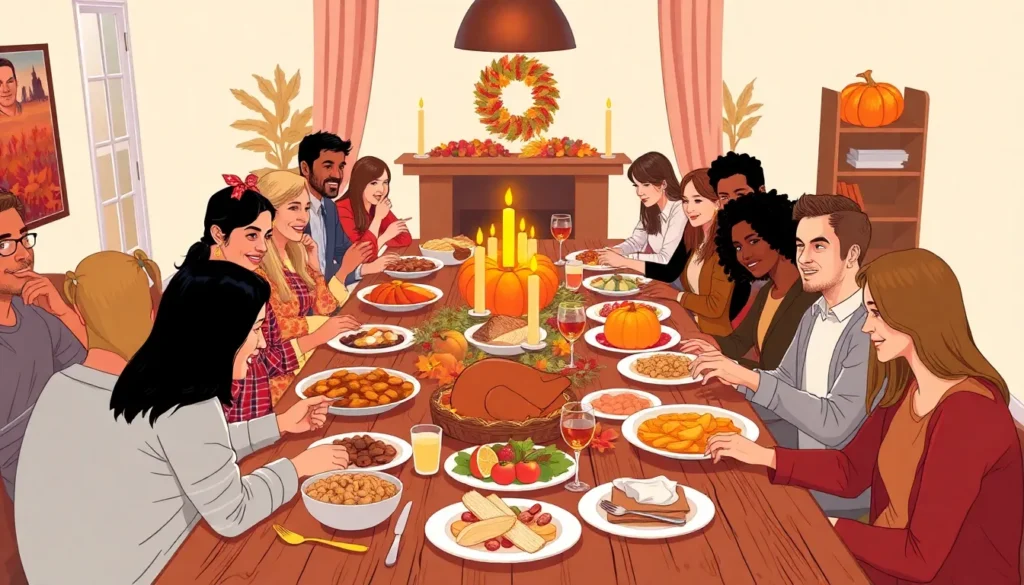Holidays are like the world’s greatest buffet—each culture brings its own unique dish to the table. From the twinkling lights of Diwali to the festive feasts of Thanksgiving, these traditions not only fill our bellies but also our hearts with joy. Imagine dancing around a Christmas tree in a snowstorm while sipping hot cocoa, or participating in a lively Lunar New Year parade, complete with dragons and firecrackers.
Table of Contents
ToggleOverview of Cultural Holiday Traditions
Cultural holiday traditions represent the unique practices and celebrations that bring communities together. These customs vary widely across regions. Diwali, celebrated with lights and fireworks, symbolizes the victory of light over darkness in Hindu culture. Thanksgiving offers gratitude through feasting, uniting families in a shared meal in the United States. Celebrations of Christmas emphasize joy, involving trees adorned with ornaments, gift-giving, and community gatherings in many Western nations.
Lunar New Year, marked by vibrant parades, showcases cultural heritage through lion dances and fireworks in various Asian cultures. Each tradition often reflects the values and histories of the people who observe them. Celebrations frequently include music, dance, and traditional foods, fostering a sense of belonging and continuity.
Countries around the globe contribute their unique flavors to the holiday calendar. For example, Carnival in Brazil features colorful costumes and lively street parties, embodying the spirit of festivity. Eid al-Fitr, marked by communal prayers and generous feasting, underscores the importance of charity and sharing in Islamic communities.
Participants in these celebrations often pass down traditions through generations. Rituals, feasts, and ceremonies evolve, yet still maintain connections to their historical roots. The impact of cultural holiday traditions extends beyond mere observance; they strengthen communal ties and enrich cultural identity. Celebrating these diverse customs enhances understanding and appreciation among different cultures, creating a global tapestry of traditions that unite people across the world.
Major Cultural Holiday Traditions Around the World

Cultural holiday traditions reflect the values and histories of their communities. Each region boasts distinct practices that celebrate and unite people.
Asia
Diwali celebrates light over darkness in Hindu culture. Families illuminate their homes with diyas to symbolize hope and prosperity. The Lunar New Year, widely observed in countries like China and Vietnam, features vibrant parades and lion dances, showcasing cultural heritage. Eid al-Fitr marks the end of Ramadan, emphasizing charity and communal prayers among Muslims. These customs foster unity and a sense of belonging while highlighting diversity.
Europe
Christmas traditions vary across Europe, with each country adding unique flavors. In Germany, markets brim with festive goods, while the UK celebrates with family gatherings and Christmas crackers. The Feast of St. Nicholas, observed on December 6, showcases gift-giving customs in several countries. Carnival in Italy and France features colorful masks and parades, offering joyful celebrations before Lent. These traditions blend history, community, and cultural pride.
Africa
Throughout Africa, cultural holiday traditions embrace community and heritage. Kwanzaa, celebrated in the African diaspora, emphasizes unity, creativity, and family. In Ethiopia, Christmas takes on a distinct flavor with its Orthodox Christian practices and traditional feasting. The various harvest festivals reflect gratitude and connection to the land, featuring vibrant local music and dances. Each tradition tells stories of resilience and rich cultural diversity.
Americas
In the Americas, Thanksgiving holds a special place, symbolizing gratitude and togetherness. Families gather for elaborate feasts, sharing dishes that reflect cultural backgrounds. In Mexico, Día de los Muertos honors deceased loved ones, blending indigenous and Catholic traditions through colorful altars. Carnival festivities in Brazil dazzle with parades, samba music, and intricate costumes that celebrate cultural vibrancy. These traditions enrich communal life, fostering connections among diverse populations.
Unique Cultural Holiday Traditions
Cultural holiday traditions vary widely across regions, showcasing vibrant expressions of identity. They often include festivals that highlight community spirit and shared values.
Festivals and Celebrations
Festivals often feature colorful parades, music, and dance. Diwali in India celebrates the triumph of light over darkness, attracting millions with its brilliant displays. Lunar New Year festivities incorporate lion dances and fireworks, marking the start of a new year in many Asian cultures. In Brazil, Carnival transforms cities into festive playgrounds, celebrating life with energetic street parties. Each celebration serves as an opportunity for communities to come together, honoring history while forging new memories.
Food and Culinary Practices
Food plays a significant role in cultural holiday traditions, uniting family and friends. Thanksgiving in the United States revolves around shared meals, featuring turkey and pumpkin pie. Eid al-Fitr includes special dishes that vary by region, fostering a sense of community through communal feasts. Traditional foods during Christmas vary globally, with German stollen, Italian panettone, and English Christmas pudding making regular appearances. These culinary practices often reflect historical significance, preserving recipes passed down generations while enhancing the holiday experience.
Influence of Cultural Holiday Traditions on Society
Cultural holiday traditions significantly shape societal norms and values. They foster unity within diverse communities and reinforce shared identity. Traditions like Diwali, Thanksgiving, and Christmas connect people through common practices and values, bridging gaps between generations.
Shared experiences enhance interpersonal relationships. For example, Thanksgiving gatherings bring families together, emphasizing gratitude and appreciation. Similarly, Lunar New Year celebrations encourage family reunions, promoting a sense of belonging amidst cultural heritage.
Traditions also contribute to cultural dialogue and understanding across different societies. Eid al-Fitr, for instance, not only emphasizes charity but also invites people outside the Muslim community to participate in festivities, fostering inclusivity and respect among diverse backgrounds.
Food plays a crucial role in these cultural expressions. Every celebration features traditional dishes that unite families and friends. For example, family members prepare Diwali sweets together, strengthening bonds through culinary practices. Christmas meals often include unique regional recipes, showcasing local customs and enhancing community pride.
Celebrations symbolically reflect historical narratives and community values. Carnival in Brazil showcases resilience and creativity through vibrant parades, while Kwanzaa emphasizes African heritage and unity. Each tradition provides a platform to honor past experiences while evolving in contemporary contexts.
Cultural holiday traditions not only celebrate unique practices but also promote social cohesion. They enhance the understanding and appreciation of diverse cultures, weaving a rich tapestry of shared human experiences. By participating in these traditions, individuals contribute to a more inclusive, connected society that celebrates differences and fosters mutual respect.
Cultural holiday traditions play a vital role in shaping identities and fostering connections within communities. They highlight the beauty of diversity while emphasizing shared values and experiences. By celebrating these unique customs, individuals not only honor their heritage but also contribute to a richer understanding of one another.
The culinary delights and vibrant festivities associated with these traditions create lasting memories and strengthen bonds among family and friends. As people engage in these time-honored practices, they help weave a tapestry of cultural richness that enhances social cohesion. Embracing these traditions paves the way for a more inclusive society where differences are celebrated and respected.




